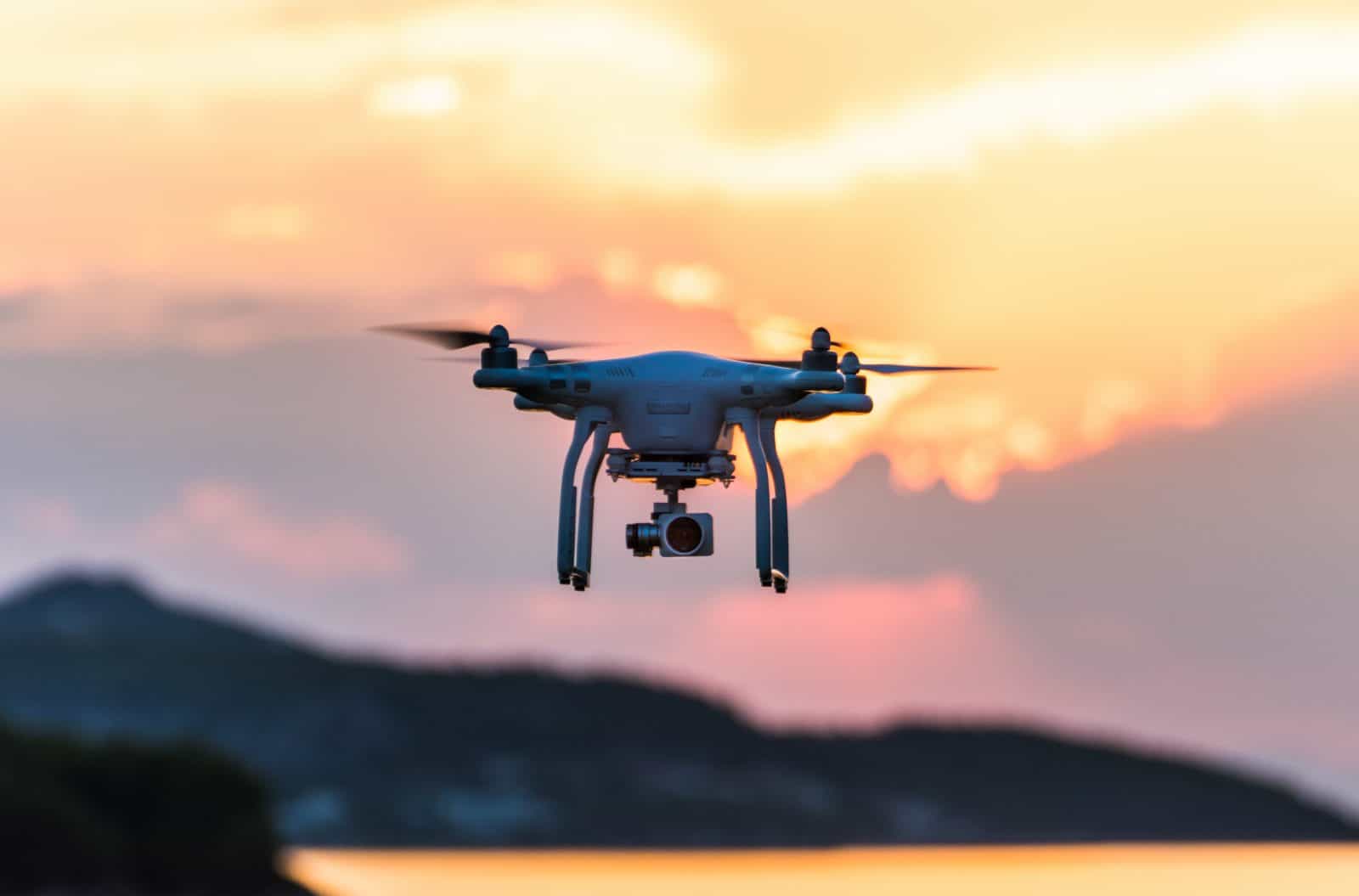Drones use by Public Safety Agencies has been growing explosively.
How fast are public safety agencies adopting drone use?
The number of agencies adopting drones increased by over 82 percent between 2016 and 2017.
At least 910 agencies now own one or more drones.
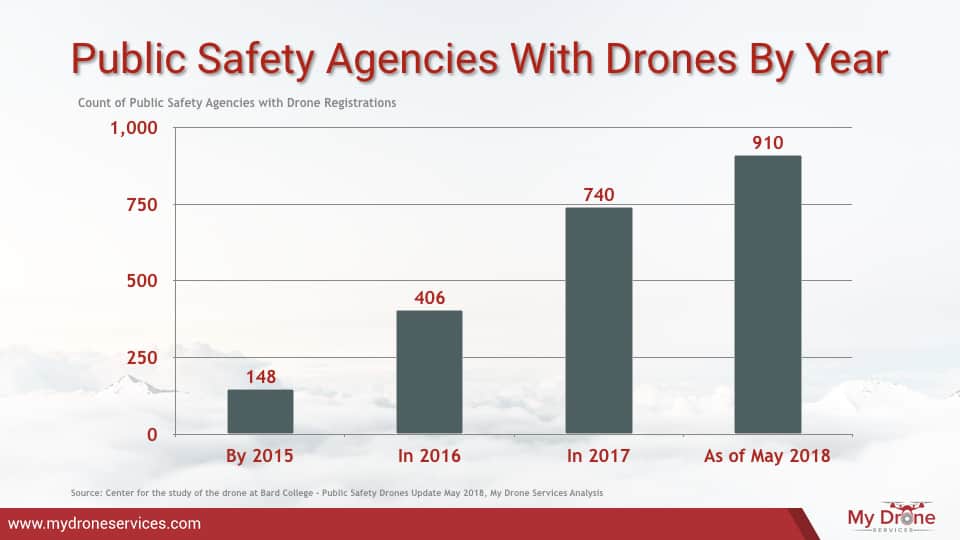
Which types of Public Safety Agencies have been adopting drones?
While this growth has been mostly in law enforcement and police drones, there has also been significant adoption among Fire departments, EMS and Emergency Response, Emergency Management Agencies, and Statewide Agencies.
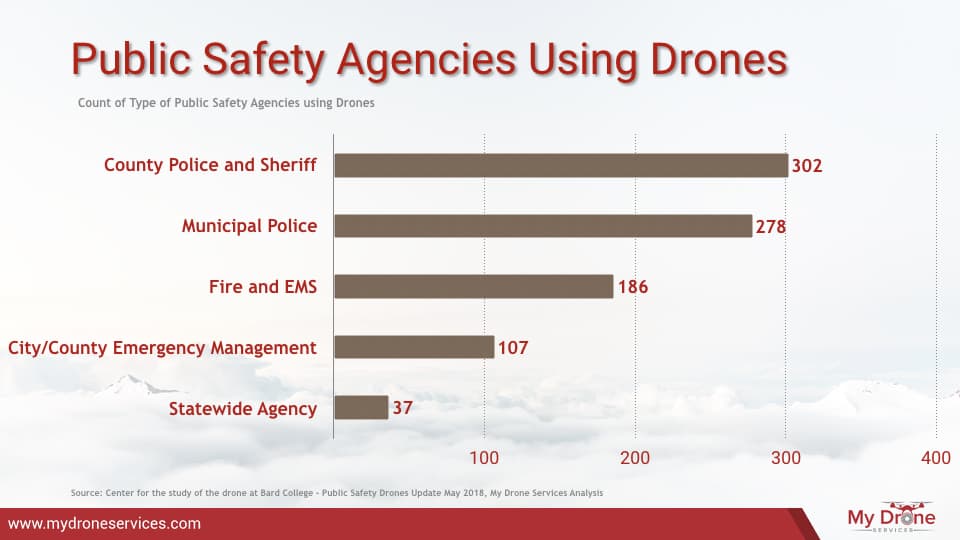
Is there a difference in drone adoption by the size of the Public Safety Agency?
Smaller agencies, with fewer resources and covering larger territories, have been the largest adopters of drone technology.
Almost half (48%) of the agencies adopting drones had fewer than 100 employees.
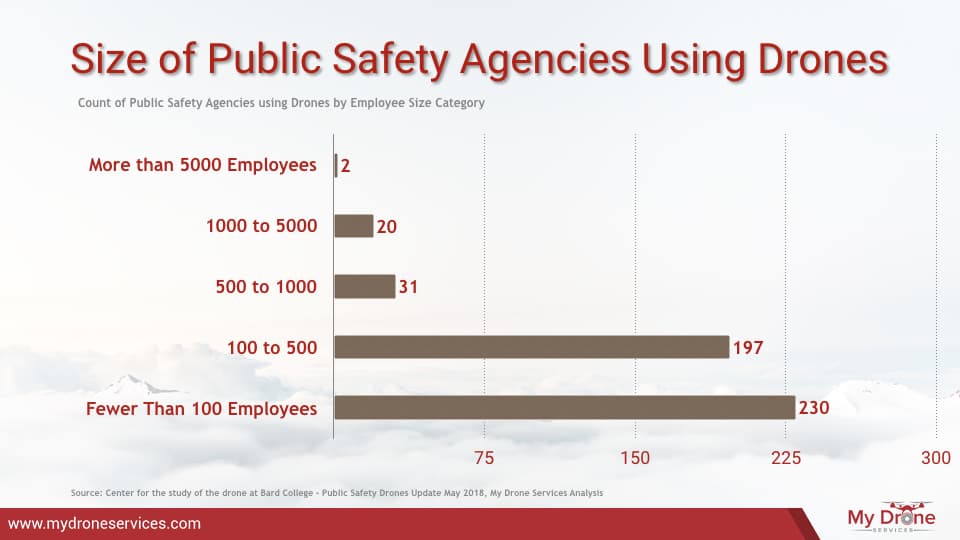
Which drone manufacturers do public safety agencies use?
As we have reported before on consumer and hobbyist drones, the manufacturer of choice among public safety drones is the market leader, DJI. DJI drones represented almost 87% of those registered by Public Safety Agencies. Yuneec and Physical Sciences were dramatically smaller providers, with 5.1% and 2.3% of the market.
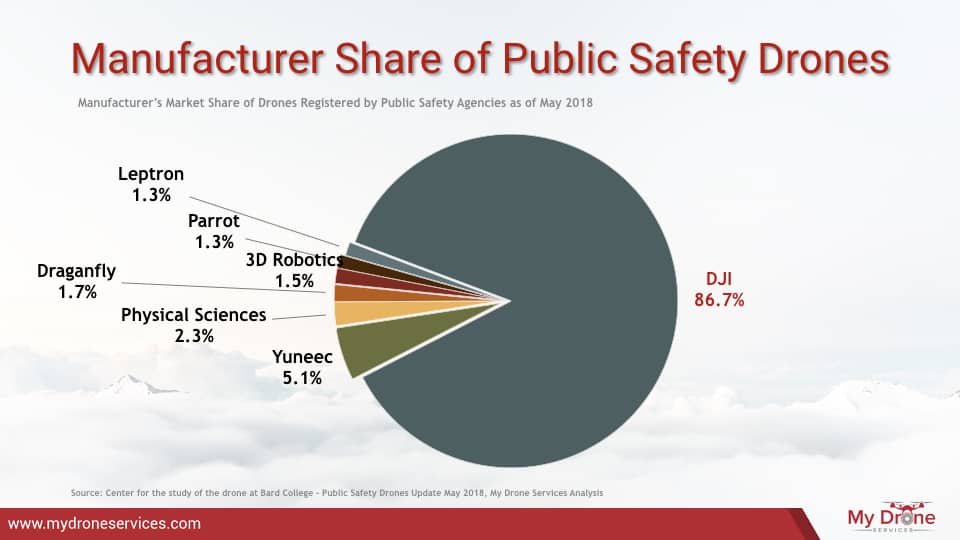
Which drone model do public safety agencies prefer?
The top 5 Public Safety Drone model families in use by Public Safety Agencies were:
DJI Phantom
DJI Inspire
DJI Matrice
DJI Mavic, and
Yuneec Typhoon
The DJI Phantom family alone represented 40%, while DJI Inspire accounted for another 32% of the total.
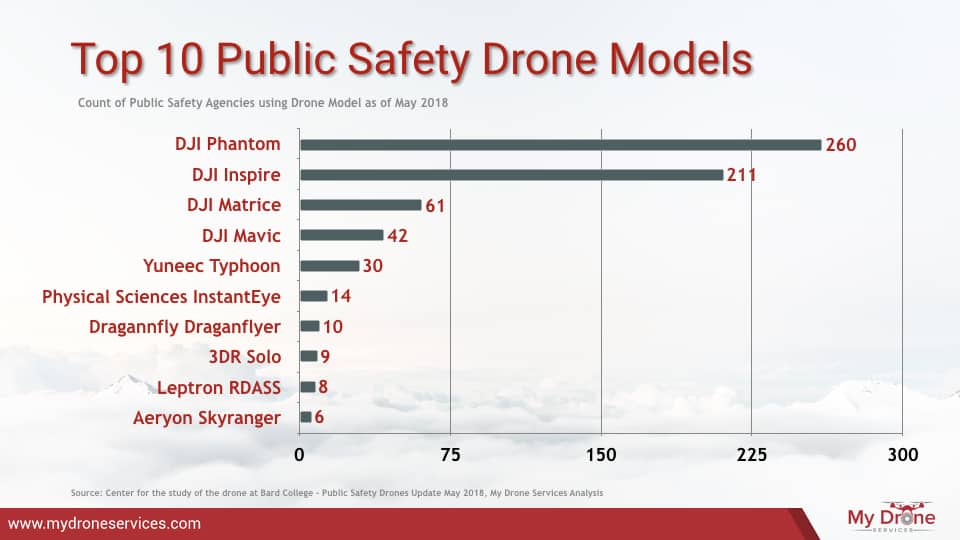
Which states have shown the highest adoption of drone use by public safety agencies?
Texas, California, and Wisconsin are the states leading the pack in drone adoption among public safety agencies.
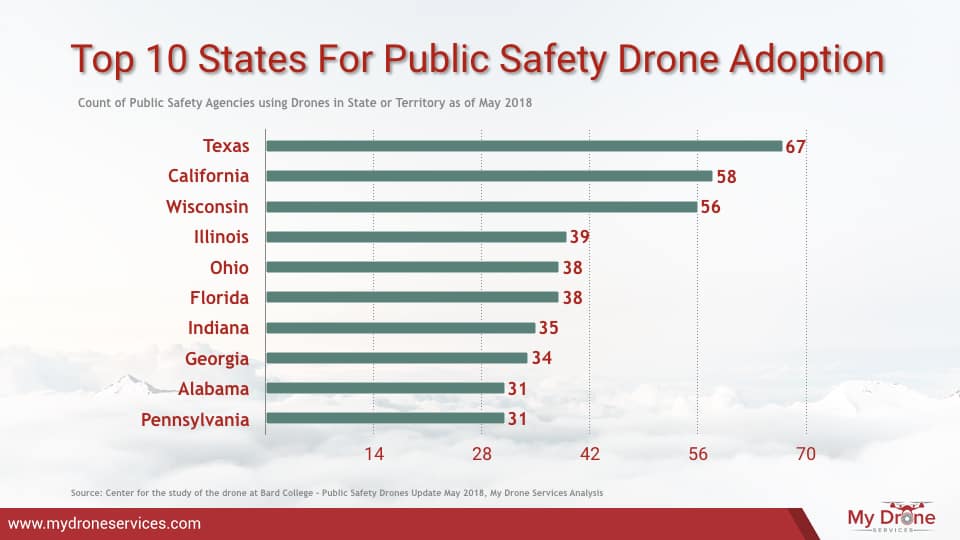
Are the top adopting states also the top consumer and professional drone usage states?
The top 10 states where Public Safety Agencies have embraced drone technology are mostly the top 10 states where Drones were registered by consumers and hobbyists, except for Wisconsin, Indiana, and Alabama. These three states were among the top 10 with Public Safety Agency drone adoption, ahead of their consumer adoption.
New York, Michigan, and Washington show much faster adoption among consumers and hobbyists, ending up in the top 10 list but lagging on Public Safety adoption.
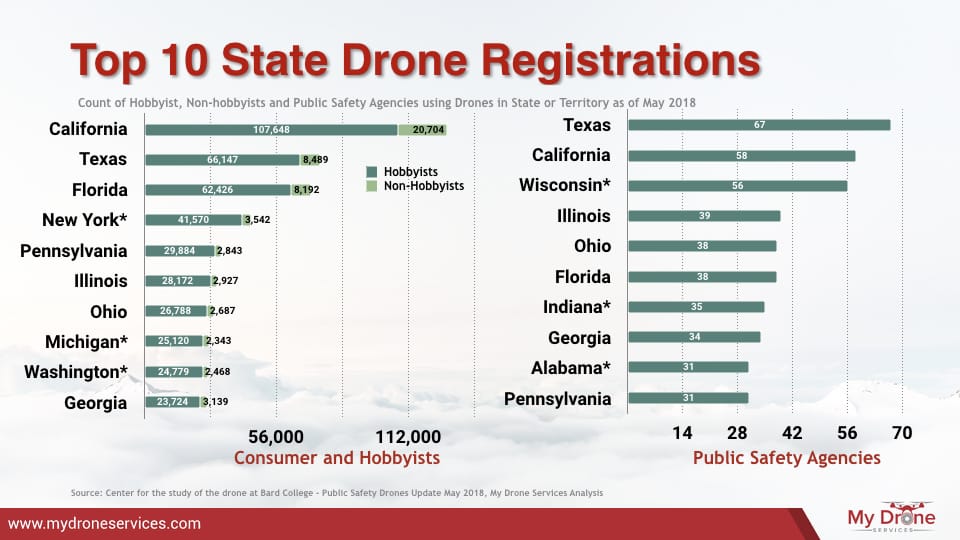
Where are the most drone incidents reported today?
It is surprising that New York Public Safety Drone adoption wasn’t higher, given it’s the 3rd highest rate of Drone Incidents among states.
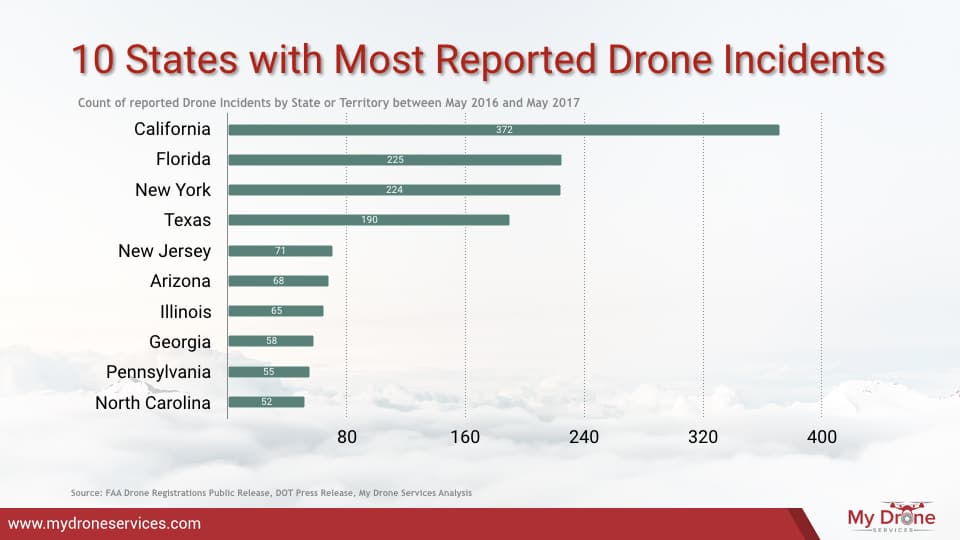
How are the public safety agencies funding their drone purchases?
Only a small portion of the drones used by Public Safety Agencies come from budgeted funds (only 10%).
Another 15% have come from purchases using forfeited funds.
The vast majority of the agencies are acquiring drones through donations (46%).
We would expect that trend to change over time as the usefulness of drones becomes integral to the public safety agencies’ mission.
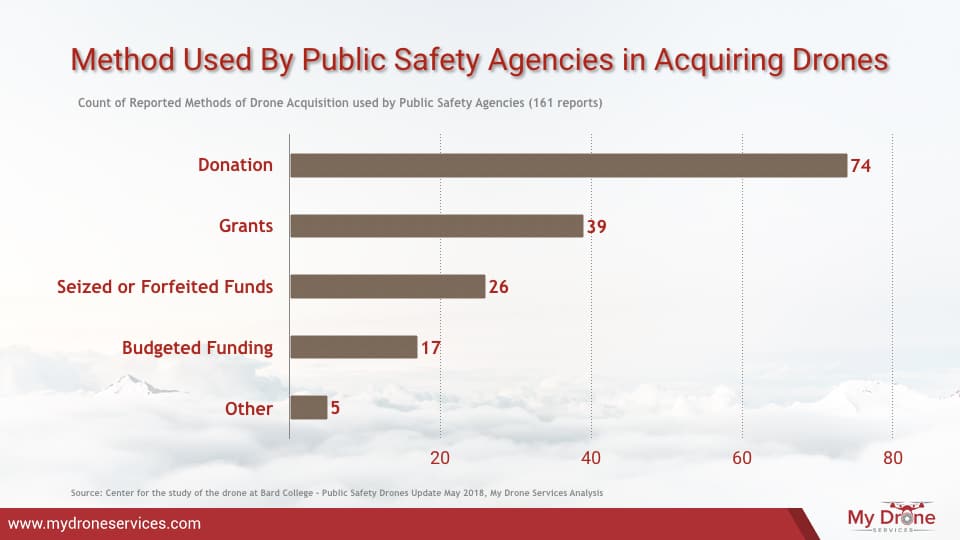
How can public safety agencies find funds to acquire drones?
When you consider adding a Remote Piloted Aerial System (RPAS), referred to as a drone, to your public safety agency tool-set, continue reading the following guide, which discusses funding options for acquiring those drones.
Police and other law enforcement and public safety agencies across the U.S. are seeing drones as another valuable asset in their crime-fighting and first-response toolbox. Over the past few years, law enforcement has used drones for various missions. These include surveillance, search and rescue, criminal pursuit, monitoring large crowds, crime scene analysis, and drug interdiction, among others.
Finding the funds to buy the necessary drone equipment and accessories and to pay for staff drone operations training can be challenging. Here’s a variety of grants and other funding opportunities to look at that won’t put a burden on your department’s budget.

Funding for drone use by public safety agencies – Homeland Security
Homeland Security funding is the most used grant source for public safety drones. Consider applying for Homeland Security Grants if someone will use your equipment for domestic or international terrorism events that threaten your local community or for bomb investigations, crowd monitoring, or search and rescue. Most of these federal grants come through your state’s homeland security or emergency management agency, but it bases decisions on the uses of these funds on local planning. Grant applications for equipment that will become a regional asset receive preferential treatment.
Funding for drone use by public safety agencies – Byrne Justice Assistance Grants
Justice Assistance Grants are the largest sources of grant money to support public safety and law enforcement equipment and training. Many local municipalities get local Justice Assistance Grants allocated from the federal government based on their share of their state’s three-year average violent crime rates. When your county or city receives a Justice Assistance Grant, you should encourage your grant administrators to set aside some of those funds to pay for the training and drone equipment.
Each state and U.S. territory receives an annual Justice Assistance Grant for contributions to local and state agencies that don’t qualify for the local allocations. You should work with your State Administering Agency representative to syndicate your needs and to ensure they include those in the next application.
Funding for drone use by public safety agencies – Federal Highway Traffic Safety Grants
Planning to use the drone for accident investigations? Then tap into a great source, which is your state’s highway traffic safety funds. The National Highway Transportation Safety Administration hands out these Federal dollars to the states. The Section 402 Grant Program for State and Community Highway Safety has many areas that they focus their support on. These include accident reduction and emergency service enhancements. States offer grants to local law enforcement and other public safety agencies through a competitive application. You should contact your state transportation department to find out how to apply for these funds.
Funding for drone use by public safety agencies -HIDTA and Project Safe Neighborhood
If your agency is part of a multi-agency task force in a High-Intensity Drug Trafficking Area or Project Safe Neighborhoods district, then drones can be incredibly useful for your mission. They can help with drug interdiction missions and are a valuable part of any violent crime reduction strategy. Encourage the leadership of your task force to prioritize drone funding in their budget requests. Competitive drone funding is available from the High-Intensity Drug Trafficking and Project Safe Neighborhoods programs.
Funding for drone use by public safety agencies -Corporate and Private Foundations
Most large corporations across the U.S., based on their own priorities, have foundations or “giving programs” offering grants or donations. Often, the priority is supporting the local community in which they operate. Contact the managers of corporate offices in your area. They can help you to determine what funding is available and how to get access to those funds. Don’t forget to check the companies’ website. These are frequently great source that highlights information about their grant or community giving programs.
Big box retailers such as Sam’s Club, Target, and Walmart, among others, may offer grants to support public safety and community welfare. Firehouse Subs also gives grants for law enforcement, police and fire, and first responder equipment across the country. National freight railroad companies such as BNSF, CSX, and Union Pacific all administer grants focusing on keeping the communities safe where their lines operate. Reach out to your local bank, utility company, or grocery store. Many of them have grant programs operating within their corporate affiliate.
Private community foundations operating in your area may have funding available based on your location or public safety mission. The Foundation Center is an excellent source for locating community and other private funders.
Funding for drone use by public safety agencies – Asset Forfeiture Funds
Many law enforcement agencies have access to and use asset forfeiture dollars to support purchases of drone equipment, accessories, and training. Speak with your department leadership and encourage them to consider using these funds or assets to cover your purchase.
Know the public safety drone use grant restrictions
Some federal grant programs list drones under the “controlled equipment” category and place restrictions on using federal funding to cover their purchase. The restrictions were removed or relaxed in the last year, but understand and follow the new guidelines set out by the Federal Emergency Management Agency and the Bureau of Justice Assistance when using these grant sources for your purchase. To prevent misuse, you may need to justify the equipment choices and document you have the appropriate privacy controls in place to get a waiver from the appropriate federal agency.
Federal grant application periods are more frequent in the spring and summer, so you want to align your grant request schedule to meet those deadlines. Monitor the links noted in the article for upcoming deadlines. Grants. gov is also an excellent source for staying current on federal grant announcements or forecasted grants.
Persistence, following the application instructions, and preparing a solid justification letter will get you the drone you need for your essential policing and public safety work.
Recent Trends Affecting Drone Use By Public Safety Agencies
Drone Sourcing
The argument over the security of drone data has been ongoing for some time. In the USA, due to National Security concerns, Chinese-origin drones have come under extreme pressure about drone tracking and whether or not data is actually leaking back to China. As a result, there is a significant effort to identify drone solutions that meet national security requirements.
This chase for compliant drones is driving significant interest and investments in the emerging drone industry, especially among domestic drone producers.
On August 20, 2020, the Pentagon announced that after 18 months of rigorous testing, it had approved five drone suppliers. The four US companies approved were Altavian Inc., Skydio Inc., Teal Drones, and Vantage Robotics. France’s Parrot SA was the fifth company approved.
While these drones are finely tuned for military activity and have been approved for military missions, we would expect to see more adoption in every public safety drone program.
Tactical Beyond Visual Line of Sight (BVLOS) Operations
In August 2020, at the FAA UAS Symposium, the FAA signaled a change in the regulatory environment and announced plans for a new waiver to allow Public Safety Tactical Beyond Visual Line of Sight (TBVLOS) operations for first responders.
In a time of extreme emergencies to safeguard human life, first responders require the capability to operate their unmanned aircraft (UAS) beyond visual line of sight (BVLOS) to assess the operational environment such as a fire scene at a large structural fire, to conduct an aerial search on a large roof area for a burglary in progress, or to fly over a heavily forested area to look for a missing person.
To support public UAS operators acting in an active first responder capacity, the FAA may approve First Responder Tactical Beyond Visual Line of Sight (TBVLOS) waivers to 14 CFR 91.113(b).”
Federal Aviation Administration Spokesperson
BVLOS operations are frequently thought of in commercial drone operations. However, its application can be quite profoundly helpful for public safety operations.
For example, a fire department might use it to get an aerial perspective or to fly around the back of a building in flames. A police department could use it for situational awareness or, in an active shooter situation, to fly around the corner where the shooter may be operating.
Clearly, there are many other uses for BVLOS drone operations, and the FAA waiver would open up drones for many more interesting public safety missions in the future.
Drone Sightings and Drone Mitigation
Recently, the number of reported suspicious drone activity has risen dramatically. The FAA receives more than 100 reports of drone sightings from pilots each month. Both the FAA and law enforcement officers have expressed concern, and the media has picked up on this story.
To be fair, many suspicious drone sightings and suspicious drone activity reports have not been verifiable. The suspicious drone activity reported in Colorado has been investigated extensively without any credible explanation provided.
Given the safety concern, the FAA continues to explore methods by which drone activity can be better tracked and regulated. Expect to see an advisory circular from the FAA on drone tracking requirements in the near future.
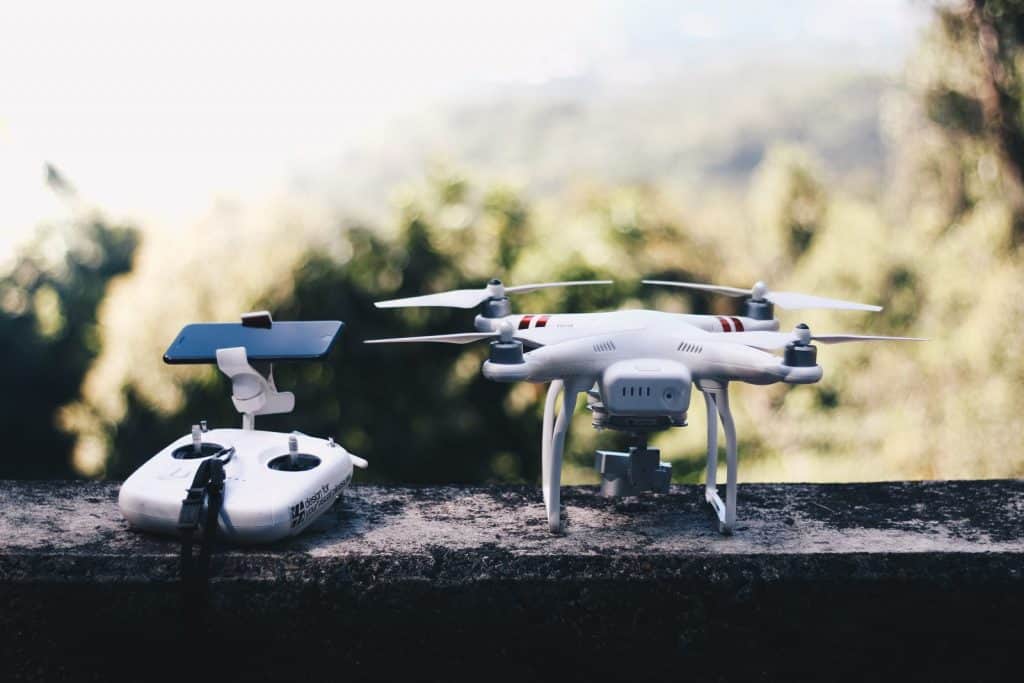
What Drone Solutions Should Public Safety Agencies Consider?
Sensors and flight time required will typically dominate the choice of drone system solutions required by public safety agencies. Drone sensors, gimbals, and software stack can range from thermal imaging, optical imaging, and photogrammetry to LIDAR, so we highly recommend talking with a specialized drone system integrator to help identify the best fit for your mission. Then, you can move on to selecting the appropriate drone flight platform.
Public Safety drone operations or flight missions vary dramatically from requiring solutions that are grab-and-go for ad-hoc missions to video surveillance flights over a specific location for an extended period.
Various available drone choices can meet the grab-and-go drone program requirements.
At the low end, the readily available consumer drones will have limited customization choices. They will generally have a video or photography sensor pre-installed.
At the higher end, the choices of gimbals and sensors that can be attached to the customizable drones are quite varied.
Tethered drone solutions are tightly integrated to provide extended flight times.
Drones are a vital tool for enhanced visibility, field investigations, and a host of other necessary public safety missions. Be proactive in adding high-tech drone hardware as an integral element of your program development.
There is no ideal drone. There are always tradeoffs to be made in selecting the right drone for your mission. So, we are providing a table that highlights the major differences between the top drone flight platform choices available to public safety agencies:
Comparison of Drones Used by Public Safety Agencies
Notes:
We have used the term Drone to refer broadly to Unmanned Aerial Vehicles, Unmanned Aerial Systems, Unmanned Aircraft Systems (UAS), or Remotely Piloted Aerial Systems (RPAS)
The data was provided by the Center For The Study of The Drone at Bard College.
Public Safety Departments and Agencies include Local police departments, County Police, Sheriff, Municipal Police, Fire departments and EMS, City/County Emergency Management, and Statewide Agencies.
Useful Links:
Helpful information on using a Thermal Camera (for inspections)
Links to Drone Providers Mentioned Above and those focusing on Public Safety Operations:
DJI Reviews – DJI Company
Elistair Review – Elistair Company
Parrot Review – Parrot Company
Skydio Review – Skydio Company
Vantage Robotics review – Vantage Robotics Company

Leon Shivamber
Partner
Advisor, Entrepreneur, Strategist, & Transformation Agent

Tom McKeefery
Partner
Transformation, Technology, Supply Chains, and Operations
